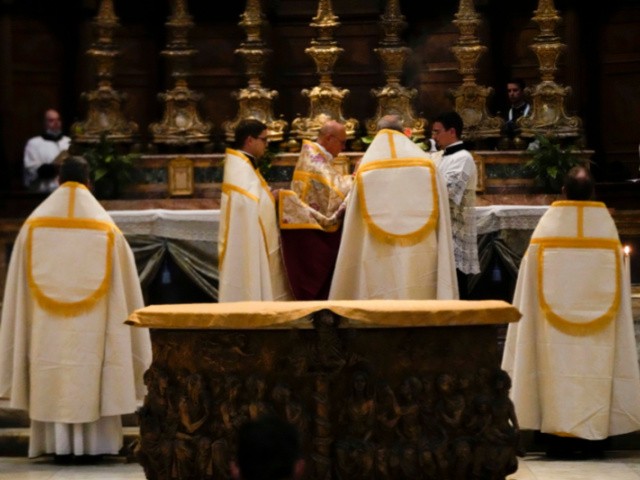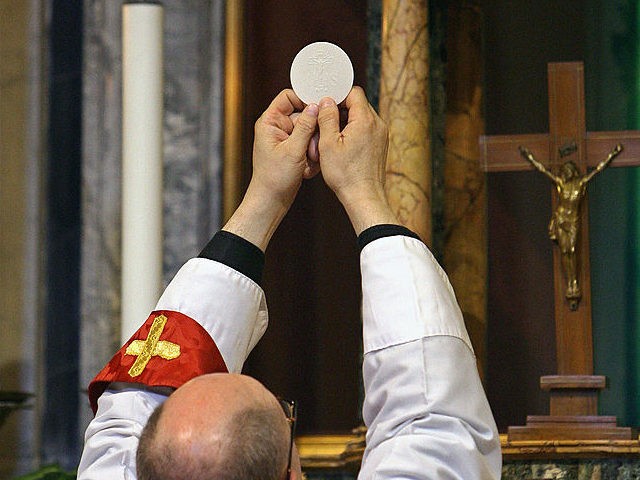ROME — Pope Francis’ war on the Traditional Latin Mass continued Tuesday as the pontiff confirmed that no bishop may grant permission for the Mass to be said without an okay from the Vatican.
The pope’s love for diversity and inclusion in all things comes to an abrupt stop when faced with the traditional liturgy, which he seems to detest with particular vehemence. On several occasions he has referred to those who prefer the traditional Mass as “retrograde.”
On Tuesday, the Vatican press office released a short text called a “rescript,” in which Francis officially confirmed that permission to celebrate the old Mass may not be granted by Catholic diocesan bishops around the world, but that all such decisions must pass through Rome in order to receive approval.
The biggest blow to traditional Catholics came in 2021, When the pope issued his apostolic letter ironically titled Traditionis Custodes (“Guardians of Tradition”), in which he banned the celebration of the Traditional Latin Mass in Catholic parishes and lifted existing accommodations to priests who want to use the extraordinary form of the Catholic liturgy.
Pope Francis cracked down on conservative Catholics on Friday, repealing inclusive measures by his predecessors Pope John Paul II and Pope Benedict XVI and imposing new restrictions on the traditional Latin Mass https://t.co/akkTNVCytZ
— Breitbart London (@BreitbartLondon) July 17, 2021
The letter reversed measures relaxing restrictions on the use of the traditional form by Pope Benedict XVI, who, in 2007, noted that many of the faithful continued to be attached with “love and affection to the earlier liturgical forms which had deeply shaped their culture and spirit.”
In recognition of this diversity, Pope John Paul II had sought greater inclusiveness by granting the faculty of using the older form and “exhorted bishops to make broad and generous use of this faculty on behalf of all the faithful who sought it,” Benedict wrote.
Benedict declared that the Roman Missal promulgated by Pope Paul VI “is the ordinary expression of the lex orandi (rule of prayer) of the Catholic Church of the Latin rite” whereas the older Roman Missal promulgated by Saint Pius V “is nonetheless to be considered an extraordinary expression of the same lex orandi of the Church and duly honored for its venerable and ancient usage.”
Francis, on the other hand, asserted that the 1970 Roman Missal is not the “ordinary expression” but rather “the unique expression of the lex orandi of the Roman Rite” (emphasis added). The new, exclusive ruling seems to eliminate the older form of the Mass as a legitimate expression of the lex orandi of the Church, despite its venerable tradition.
The Vatican’s own website states that “according to present norms, the Latin language still holds primacy of place as that language which, based on principle, the Church prefers, even though she recognizes that the vernacular can be useful for the faithful.”
The Vatican goes on to say that “Latin should be safeguarded as a precious inheritance of the Western liturgical tradition.”
The Code of Canon Law, which governs Church activity and liturgy, similarly stipulates: “The eucharistic celebration is to be carried out in the Latin language or in another language provided that the liturgical texts have been legitimately approved.”

File/A celebrating priest leads a Latin Mass at Rome’s ancient Pantheon basilica, in Rome, Italy, Friday, Oct. 29, 2021. Traditionalist Catholics descended on Rome on Friday for their annual pilgrimage, hoping to show the vibrancy of their community after Pope Francis issued a crackdown on the spread of the Latin Mass that many took as an attack on the ancient rite. (AP Photo/Luca Bruno)
Saint John Paul II urged the continued use of Latin in the Church to maintain ties with its own history and traditions.
“The Roman Church has special obligations towards Latin, the splendid language of ancient Rome,” he wrote, adding that “she must manifest them whenever the occasion presents itself.”
Pope Francis has justified the reversal of the more inclusive approach of his predecessors by insisting that their pastoral kindness “was exploited to widen the gaps, reinforce the divergences, and encourage disagreements that injure the Church, block her path, and expose her to the peril of division.”
In his 2007 lifting of restrictions on use of the older rite, Pope Benedict XVI wrote that his efforts had been “opposed on account of two fears,” one of which was “the fear that the document detracts from the authority of the Second Vatican Council, one of whose essential decisions – the liturgical reform – is being called into question.”
“This fear is unfounded,” Benedict replied.
The second fear, he wrote, was that “the possibility of a wider use of the 1962 Missal would lead to disarray or even divisions within parish communities.”
“This fear also strikes me as quite unfounded,” he stated, noting that “the two Forms of the usage of the Roman Rite can be mutually enriching.”
At that point Pope Benedict went on to declare:
What earlier generations held as sacred, remains sacred and great for us too, and it cannot be all of a sudden entirely forbidden or even considered harmful. It behooves all of us to preserve the riches which have developed in the Church’s faith and prayer, and to give them their proper place.
“The total exclusion of the new rite would not in fact be consistent with the recognition of its value and holiness,” he stated.

COMMENTS
Please let us know if you're having issues with commenting.